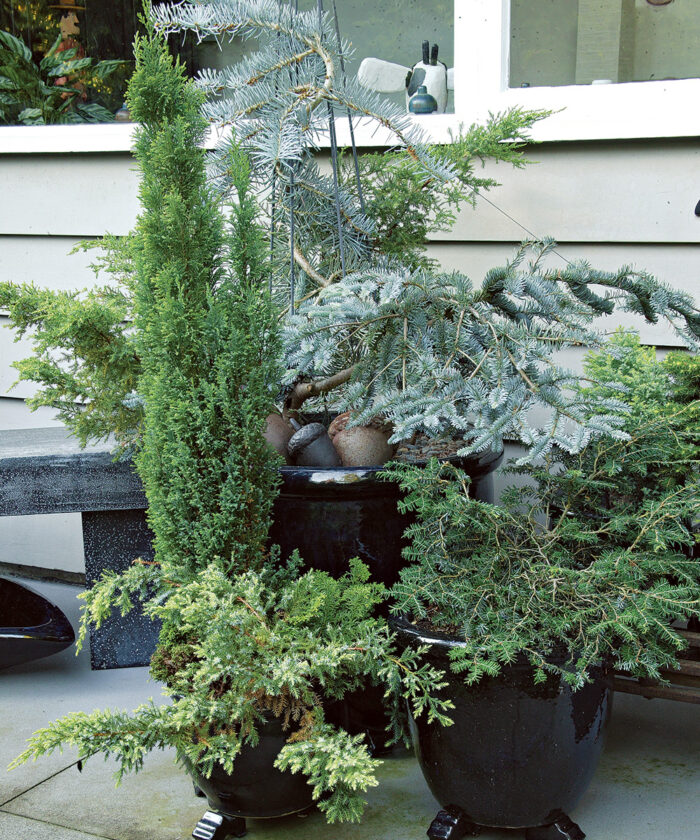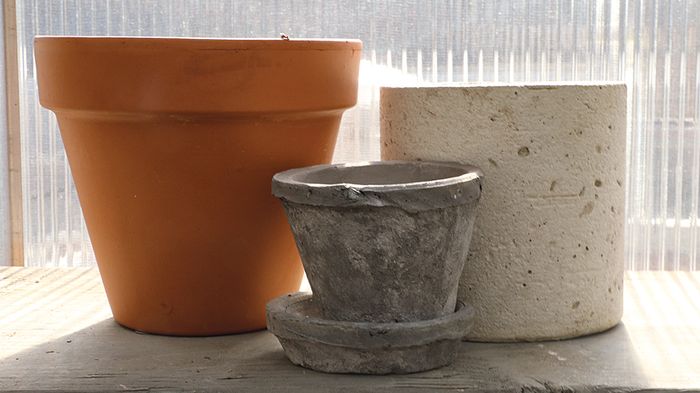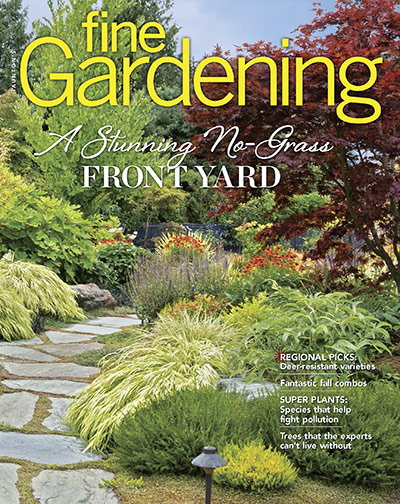How to Grow Conifers in Containers
When planted in pots, these evergreens give a space a sense of permanence

The sculptural qualities and year-round presence of evergreen conifers make them valuable assets in a garden. Planting conifers in containers is useful because they can be easily moved, combined with other potted plants, and enjoyed up close on a patio or deck no matter the season. When planted in pots, conifers give a space a sense of permanence. Before you start growing a conifer in the confined conditions of a pot, here are a few things you should know.
The right pot and soil are the keys to a good home
The first thing to consider when planting a conifer in a container is the container. Choose one suitable for your conifer to grow in for a few years—a little larger than the pot it came in and proportionate to the plant. Because you will have to repot your conifer every few years, opt for a pot with straight interior sides, which will make it easier to get the root ball out when it’s time to move to a bigger pot. Another consideration is pot shape versus plant shape. A short, squat plant looks good in a pot of similar shape; a tall, thin conifer in a taller pot, rather than a shorter one, might seem more in proportion. Try different pot shapes in the nursery to see which best suits the plant you’re buying. If you already own a few pots, take them with you!
The other component of a good home for a conifer is the growing medium. I prefer a good loamy, acidic soil with added pea gravel, lava rock, or perlite to keep the soil loose. Peat retains moisture and is less desirable for conifers than for other potted plants. Drainage is the key; the soil should drain well and stay moist, not wet. Raising the pots on feet will allow water to drain. To ensure that your conifer has access to nutrients, mix in a slow-release fertilizer at planting, then every spring add more to the surface to keep the nutrients coming. Top-dressing with stones keeps weeds at bay and creates a tidy look.
Keep conifers watered, and occasionally pot them up
Given a happy home, your conifer should need very little care. Be sure to keep the soil moist, but do not overwater. If you have ensured good drainage, this shouldn’t be a problem. As temperatures begin to cool in fall, you will need to start giving your conifer more attention. Removal of dead interior needles and branches in autumn gives better air circulation through the plant and helps prevent pests and diseases. Keep watering well up until the soil freezes in fall. Do not water frozen soil, as it will not permeate, and it may freeze on top of the soil and possibly crack the pot. If you are in a very cold climate, you can wrap the sides of the pot in bubble wrap or burlap, leaving the top and bottom open. This will provide some level of insulation against the freeze-thaw cycle that can damage roots. Potted plants may be moved to a warmer location—such as under an eave or into an unheated greenhouse or garage—but remember to water them, as they require moisture all year.
Every few years it is best to remove your conifer from its pot and replace some of the soil. At that time you can trim the roots. Although it might seem harsh, you should be fine removing up to a third of the roots with a saw or pruning shears. Or you can put the plant in a larger pot. It is also easier to repot if your conifer is growing in its own pot and so its roots are not interwoven with those of other plants. Blousy perennials or annuals can also shade some of the needles, killing them by blocking out sunlight.
Conifers can be left in a pot for a surprisingly long period of time—five years or more. But in that time you are sure to discover how easy and versatile they are, and your collection is sure to grow.
The Best Conifer Varieties for Containers
The best conifers to grow in containers are slow-growing varieties. Faster-growing plants will need to be potted up into larger pots more often. Miniature and dwarf conifers grow the slowest. According to the American Conifer Society, a dwarf conifer grows between 1 inch to 6 inches per year, while a miniature grows less than 1 inch per year. Your best bet is to look at growth rates. A plant that grows 1 to 3 inches a year is going to last longest in a pot. Here are some of my favorite options.
Miniature conifers
- ‘Kohout’s Icebreaker’ Korean fir (Abies koreana ‘Kohout’s Icebreaker’, Zones 4–7)
- ‘Sapphire Nymph’ Atlas cedar (Cedrus atlantica ‘Sapphire Nymph’, Zones 6–9)
- ‘Butterball’ hinoki cypress (Chamaecyparis obtusa ‘Butterball’, Zones 5–9)
- ‘Twinkle Toes’ Japanese cedar (Cryptomeria japonica ‘Twinkle Toes’, Zones 6–9)
Dwarf conifers
- ‘Daisy’s White’ Alberta spruce (Picea glauca ‘Daisy’s White’, Zones 3–8)
- ‘Slowmound’ mugo pine (Pinus mugo ‘Slowmound’, Zones 5–9)
- ‘Fukai’ Japanese pine (Pinus parviflora ‘Fukai’, Zones 5–9)
- ‘Gentsch White’ Canadian hemlock (Tsuga canadensis ‘Gentsch White’, Zones 3–7)
More on conifers:
The Best Conifers for Your Garden by Region
Dwarf Conifers That Can Take the Heat
Lisa O’Donnell has been growing conifers in containers for decades at her home in British Columbia.
Photos, except where noted: Steve Aitken
From Fine Gardening #202












Comments
Log in or create an account to post a comment.
Sign up Log in